Parliamentary vs Presidential Systems: Advantages in Governance
VerifiedAdded on 2023/06/05
|5
|1187
|101
Essay
AI Summary
This essay provides a comprehensive comparison of parliamentary and presidential systems of government, highlighting the key differences in the separation of powers, the roles of the executive and legislature, and the advantages of each system in contemporary governance. It emphasizes that parliamentary systems, unlike presidential systems, do not suffer from possible tyranny and are more efficient due to collective responsibility within the cabinet. The essay also discusses the ease of enacting legislation in parliamentary systems and their flexibility in removing a sitting prime minister through a parliamentary vote. The document includes a bibliography of academic sources to support its analysis.
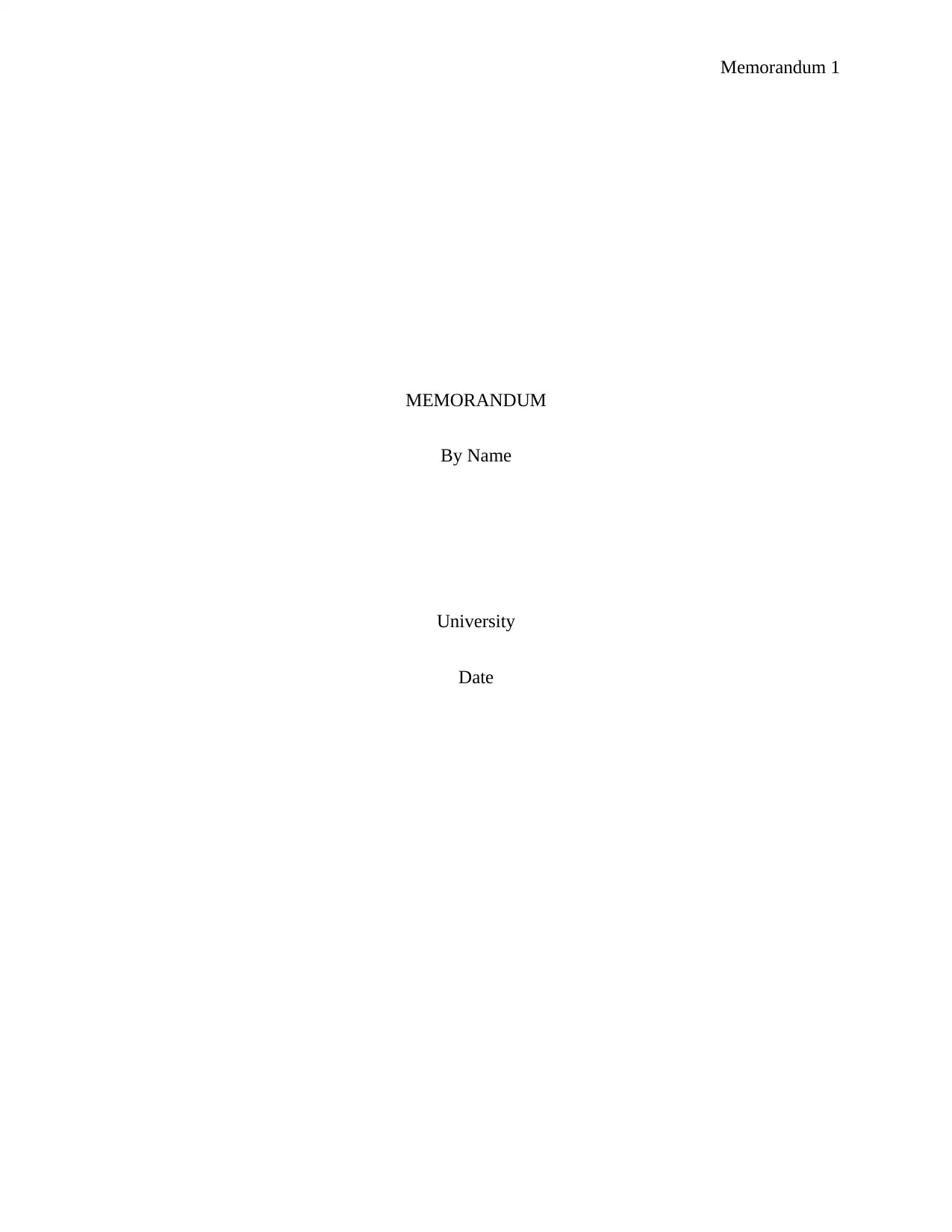
Memorandum 1
MEMORANDUM
By Name
University
Date
MEMORANDUM
By Name
University
Date
Paraphrase This Document
Need a fresh take? Get an instant paraphrase of this document with our AI Paraphraser
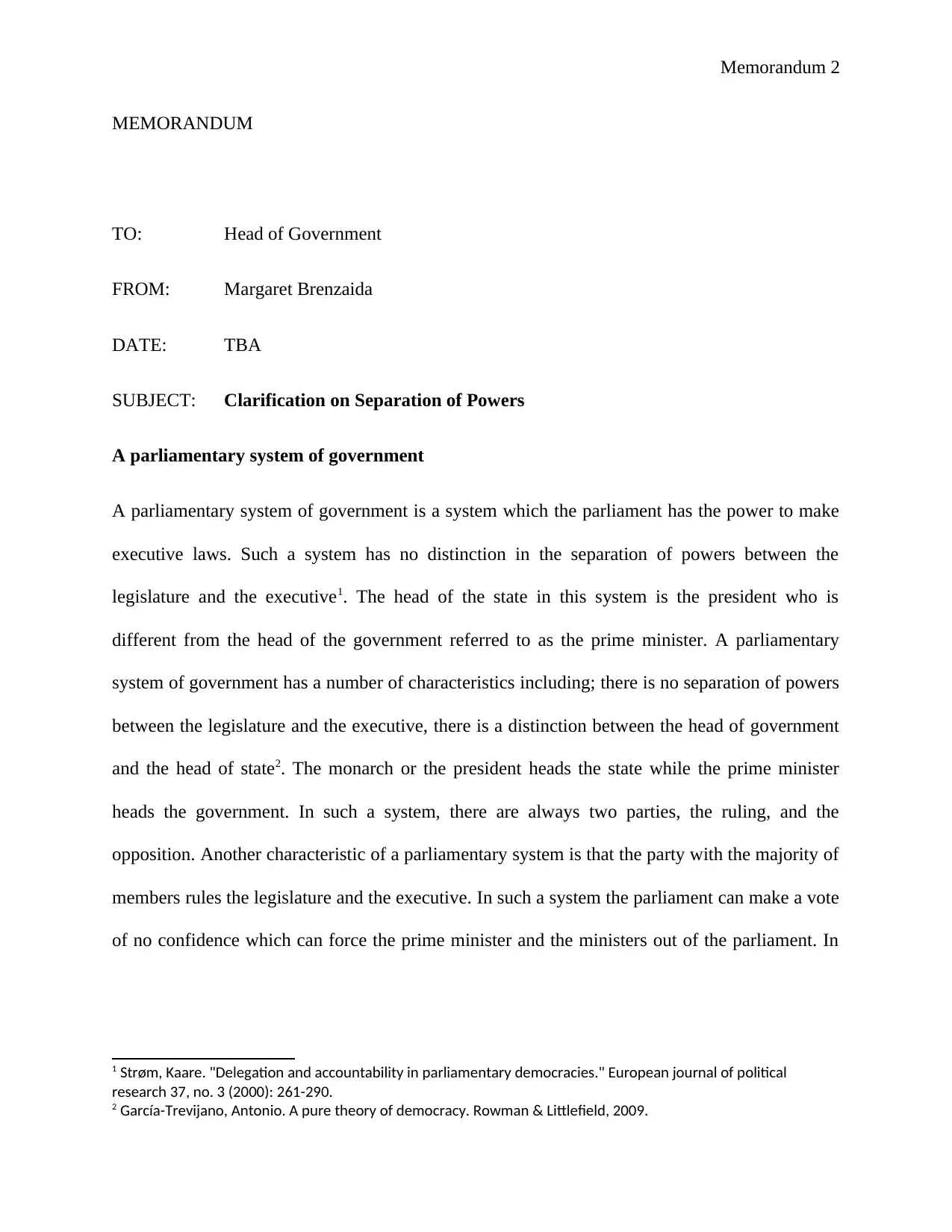
Memorandum 2
MEMORANDUM
TO: Head of Government
FROM: Margaret Brenzaida
DATE: TBA
SUBJECT: Clarification on Separation of Powers
A parliamentary system of government
A parliamentary system of government is a system which the parliament has the power to make
executive laws. Such a system has no distinction in the separation of powers between the
legislature and the executive1. The head of the state in this system is the president who is
different from the head of the government referred to as the prime minister. A parliamentary
system of government has a number of characteristics including; there is no separation of powers
between the legislature and the executive, there is a distinction between the head of government
and the head of state2. The monarch or the president heads the state while the prime minister
heads the government. In such a system, there are always two parties, the ruling, and the
opposition. Another characteristic of a parliamentary system is that the party with the majority of
members rules the legislature and the executive. In such a system the parliament can make a vote
of no confidence which can force the prime minister and the ministers out of the parliament. In
1 Strøm, Kaare. "Delegation and accountability in parliamentary democracies." European journal of political
research 37, no. 3 (2000): 261-290.
2 García-Trevijano, Antonio. A pure theory of democracy. Rowman & Littlefield, 2009.
MEMORANDUM
TO: Head of Government
FROM: Margaret Brenzaida
DATE: TBA
SUBJECT: Clarification on Separation of Powers
A parliamentary system of government
A parliamentary system of government is a system which the parliament has the power to make
executive laws. Such a system has no distinction in the separation of powers between the
legislature and the executive1. The head of the state in this system is the president who is
different from the head of the government referred to as the prime minister. A parliamentary
system of government has a number of characteristics including; there is no separation of powers
between the legislature and the executive, there is a distinction between the head of government
and the head of state2. The monarch or the president heads the state while the prime minister
heads the government. In such a system, there are always two parties, the ruling, and the
opposition. Another characteristic of a parliamentary system is that the party with the majority of
members rules the legislature and the executive. In such a system the parliament can make a vote
of no confidence which can force the prime minister and the ministers out of the parliament. In
1 Strøm, Kaare. "Delegation and accountability in parliamentary democracies." European journal of political
research 37, no. 3 (2000): 261-290.
2 García-Trevijano, Antonio. A pure theory of democracy. Rowman & Littlefield, 2009.
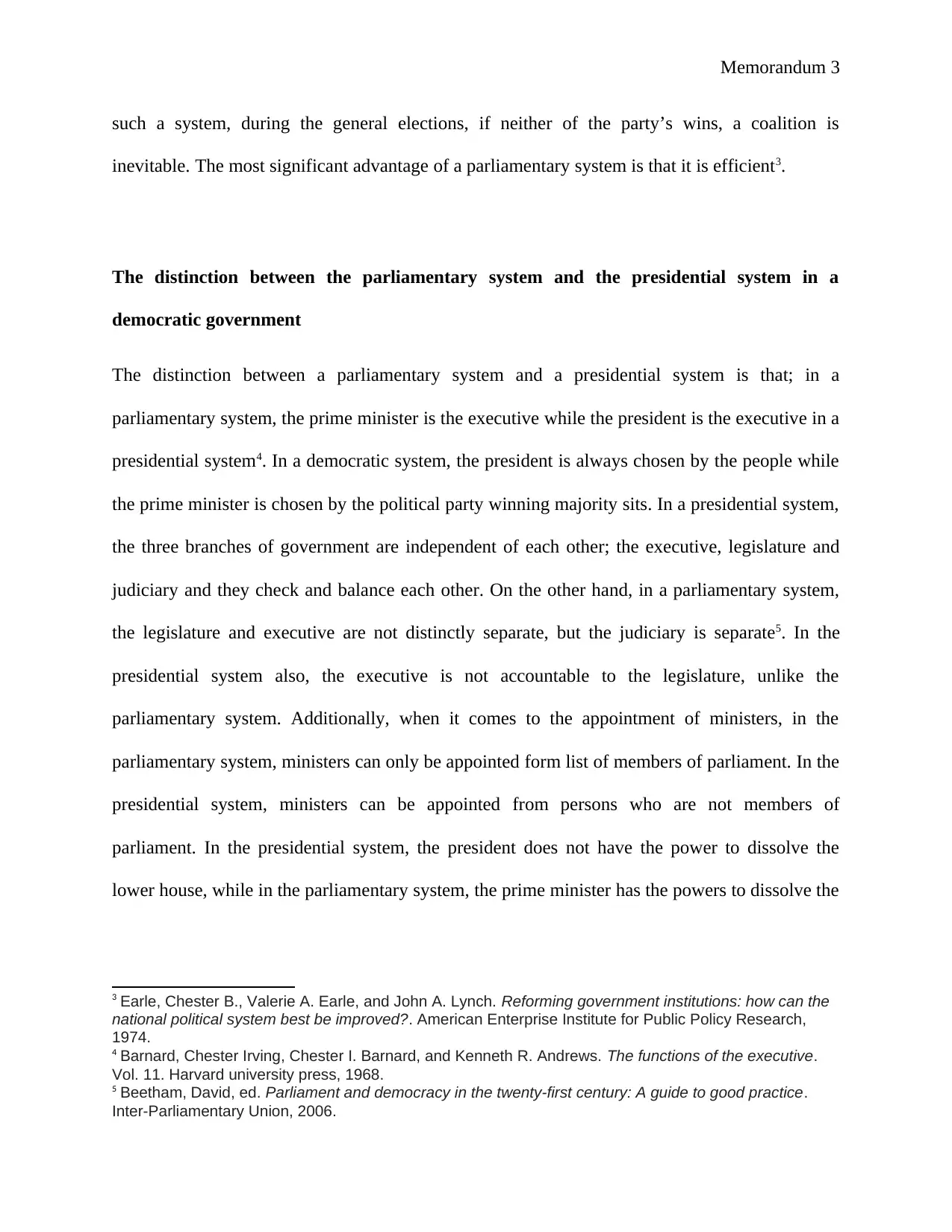
Memorandum 3
such a system, during the general elections, if neither of the party’s wins, a coalition is
inevitable. The most significant advantage of a parliamentary system is that it is efficient3.
The distinction between the parliamentary system and the presidential system in a
democratic government
The distinction between a parliamentary system and a presidential system is that; in a
parliamentary system, the prime minister is the executive while the president is the executive in a
presidential system4. In a democratic system, the president is always chosen by the people while
the prime minister is chosen by the political party winning majority sits. In a presidential system,
the three branches of government are independent of each other; the executive, legislature and
judiciary and they check and balance each other. On the other hand, in a parliamentary system,
the legislature and executive are not distinctly separate, but the judiciary is separate5. In the
presidential system also, the executive is not accountable to the legislature, unlike the
parliamentary system. Additionally, when it comes to the appointment of ministers, in the
parliamentary system, ministers can only be appointed form list of members of parliament. In the
presidential system, ministers can be appointed from persons who are not members of
parliament. In the presidential system, the president does not have the power to dissolve the
lower house, while in the parliamentary system, the prime minister has the powers to dissolve the
3 Earle, Chester B., Valerie A. Earle, and John A. Lynch. Reforming government institutions: how can the
national political system best be improved?. American Enterprise Institute for Public Policy Research,
1974.
4 Barnard, Chester Irving, Chester I. Barnard, and Kenneth R. Andrews. The functions of the executive.
Vol. 11. Harvard university press, 1968.
5 Beetham, David, ed. Parliament and democracy in the twenty-first century: A guide to good practice.
Inter-Parliamentary Union, 2006.
such a system, during the general elections, if neither of the party’s wins, a coalition is
inevitable. The most significant advantage of a parliamentary system is that it is efficient3.
The distinction between the parliamentary system and the presidential system in a
democratic government
The distinction between a parliamentary system and a presidential system is that; in a
parliamentary system, the prime minister is the executive while the president is the executive in a
presidential system4. In a democratic system, the president is always chosen by the people while
the prime minister is chosen by the political party winning majority sits. In a presidential system,
the three branches of government are independent of each other; the executive, legislature and
judiciary and they check and balance each other. On the other hand, in a parliamentary system,
the legislature and executive are not distinctly separate, but the judiciary is separate5. In the
presidential system also, the executive is not accountable to the legislature, unlike the
parliamentary system. Additionally, when it comes to the appointment of ministers, in the
parliamentary system, ministers can only be appointed form list of members of parliament. In the
presidential system, ministers can be appointed from persons who are not members of
parliament. In the presidential system, the president does not have the power to dissolve the
lower house, while in the parliamentary system, the prime minister has the powers to dissolve the
3 Earle, Chester B., Valerie A. Earle, and John A. Lynch. Reforming government institutions: how can the
national political system best be improved?. American Enterprise Institute for Public Policy Research,
1974.
4 Barnard, Chester Irving, Chester I. Barnard, and Kenneth R. Andrews. The functions of the executive.
Vol. 11. Harvard university press, 1968.
5 Beetham, David, ed. Parliament and democracy in the twenty-first century: A guide to good practice.
Inter-Parliamentary Union, 2006.
⊘ This is a preview!⊘
Do you want full access?
Subscribe today to unlock all pages.

Trusted by 1+ million students worldwide
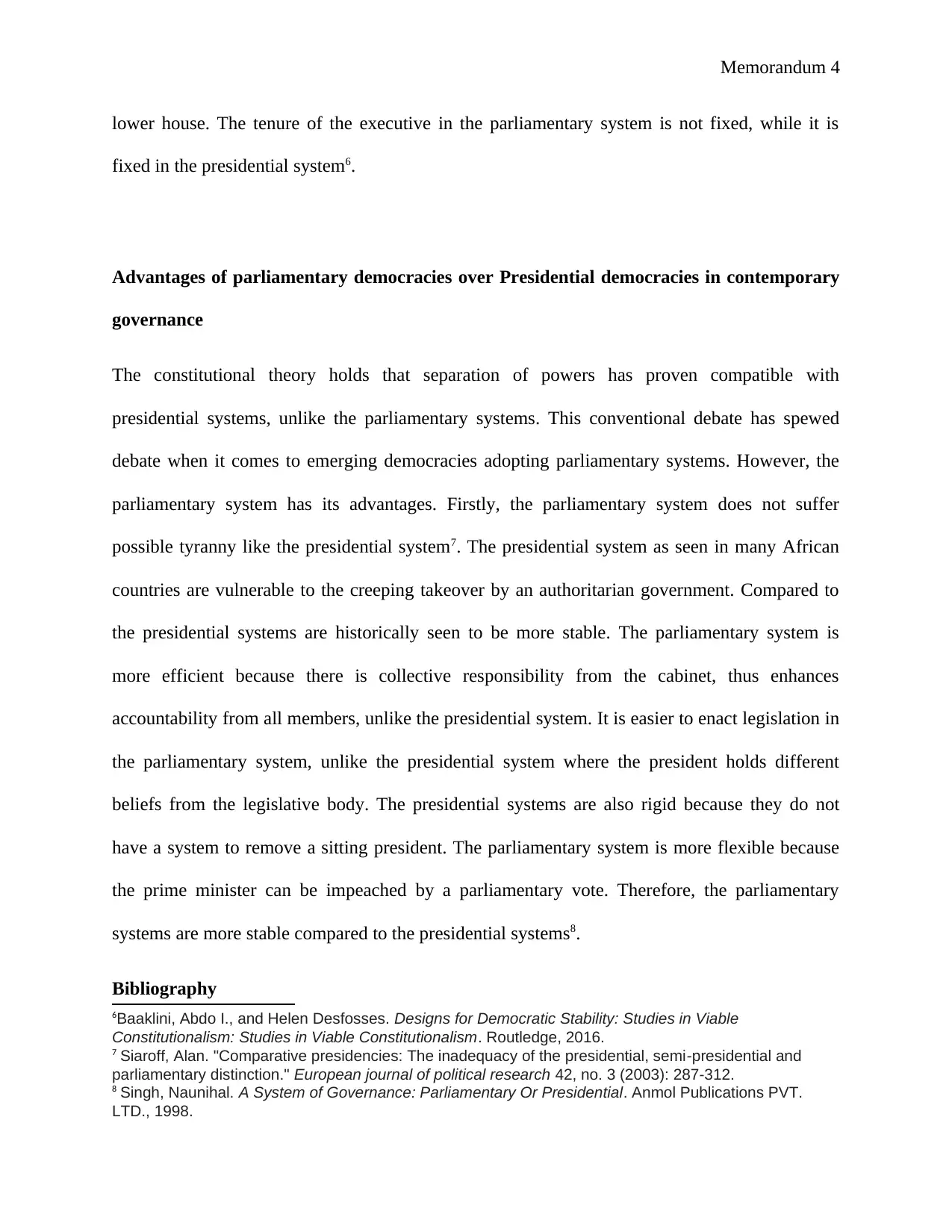
Memorandum 4
lower house. The tenure of the executive in the parliamentary system is not fixed, while it is
fixed in the presidential system6.
Advantages of parliamentary democracies over Presidential democracies in contemporary
governance
The constitutional theory holds that separation of powers has proven compatible with
presidential systems, unlike the parliamentary systems. This conventional debate has spewed
debate when it comes to emerging democracies adopting parliamentary systems. However, the
parliamentary system has its advantages. Firstly, the parliamentary system does not suffer
possible tyranny like the presidential system7. The presidential system as seen in many African
countries are vulnerable to the creeping takeover by an authoritarian government. Compared to
the presidential systems are historically seen to be more stable. The parliamentary system is
more efficient because there is collective responsibility from the cabinet, thus enhances
accountability from all members, unlike the presidential system. It is easier to enact legislation in
the parliamentary system, unlike the presidential system where the president holds different
beliefs from the legislative body. The presidential systems are also rigid because they do not
have a system to remove a sitting president. The parliamentary system is more flexible because
the prime minister can be impeached by a parliamentary vote. Therefore, the parliamentary
systems are more stable compared to the presidential systems8.
Bibliography
6Baaklini, Abdo I., and Helen Desfosses. Designs for Democratic Stability: Studies in Viable
Constitutionalism: Studies in Viable Constitutionalism. Routledge, 2016.
7 Siaroff, Alan. "Comparative presidencies: The inadequacy of the presidential, semi‐presidential and
parliamentary distinction." European journal of political research 42, no. 3 (2003): 287-312.
8 Singh, Naunihal. A System of Governance: Parliamentary Or Presidential. Anmol Publications PVT.
LTD., 1998.
lower house. The tenure of the executive in the parliamentary system is not fixed, while it is
fixed in the presidential system6.
Advantages of parliamentary democracies over Presidential democracies in contemporary
governance
The constitutional theory holds that separation of powers has proven compatible with
presidential systems, unlike the parliamentary systems. This conventional debate has spewed
debate when it comes to emerging democracies adopting parliamentary systems. However, the
parliamentary system has its advantages. Firstly, the parliamentary system does not suffer
possible tyranny like the presidential system7. The presidential system as seen in many African
countries are vulnerable to the creeping takeover by an authoritarian government. Compared to
the presidential systems are historically seen to be more stable. The parliamentary system is
more efficient because there is collective responsibility from the cabinet, thus enhances
accountability from all members, unlike the presidential system. It is easier to enact legislation in
the parliamentary system, unlike the presidential system where the president holds different
beliefs from the legislative body. The presidential systems are also rigid because they do not
have a system to remove a sitting president. The parliamentary system is more flexible because
the prime minister can be impeached by a parliamentary vote. Therefore, the parliamentary
systems are more stable compared to the presidential systems8.
Bibliography
6Baaklini, Abdo I., and Helen Desfosses. Designs for Democratic Stability: Studies in Viable
Constitutionalism: Studies in Viable Constitutionalism. Routledge, 2016.
7 Siaroff, Alan. "Comparative presidencies: The inadequacy of the presidential, semi‐presidential and
parliamentary distinction." European journal of political research 42, no. 3 (2003): 287-312.
8 Singh, Naunihal. A System of Governance: Parliamentary Or Presidential. Anmol Publications PVT.
LTD., 1998.
Paraphrase This Document
Need a fresh take? Get an instant paraphrase of this document with our AI Paraphraser
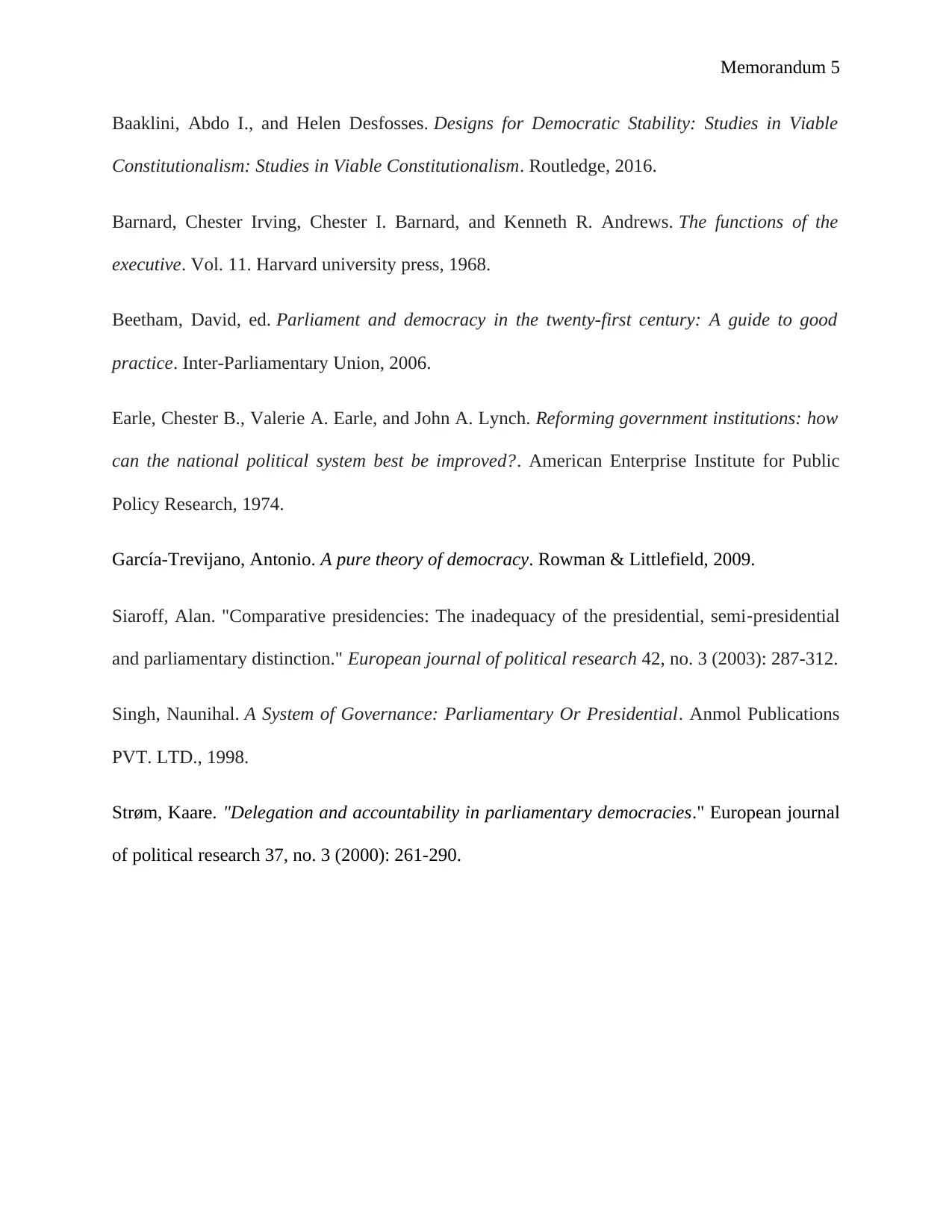
Memorandum 5
Baaklini, Abdo I., and Helen Desfosses. Designs for Democratic Stability: Studies in Viable
Constitutionalism: Studies in Viable Constitutionalism. Routledge, 2016.
Barnard, Chester Irving, Chester I. Barnard, and Kenneth R. Andrews. The functions of the
executive. Vol. 11. Harvard university press, 1968.
Beetham, David, ed. Parliament and democracy in the twenty-first century: A guide to good
practice. Inter-Parliamentary Union, 2006.
Earle, Chester B., Valerie A. Earle, and John A. Lynch. Reforming government institutions: how
can the national political system best be improved?. American Enterprise Institute for Public
Policy Research, 1974.
García-Trevijano, Antonio. A pure theory of democracy. Rowman & Littlefield, 2009.
Siaroff, Alan. "Comparative presidencies: The inadequacy of the presidential, semi‐presidential
and parliamentary distinction." European journal of political research 42, no. 3 (2003): 287-312.
Singh, Naunihal. A System of Governance: Parliamentary Or Presidential. Anmol Publications
PVT. LTD., 1998.
Strøm, Kaare. "Delegation and accountability in parliamentary democracies." European journal
of political research 37, no. 3 (2000): 261-290.
Baaklini, Abdo I., and Helen Desfosses. Designs for Democratic Stability: Studies in Viable
Constitutionalism: Studies in Viable Constitutionalism. Routledge, 2016.
Barnard, Chester Irving, Chester I. Barnard, and Kenneth R. Andrews. The functions of the
executive. Vol. 11. Harvard university press, 1968.
Beetham, David, ed. Parliament and democracy in the twenty-first century: A guide to good
practice. Inter-Parliamentary Union, 2006.
Earle, Chester B., Valerie A. Earle, and John A. Lynch. Reforming government institutions: how
can the national political system best be improved?. American Enterprise Institute for Public
Policy Research, 1974.
García-Trevijano, Antonio. A pure theory of democracy. Rowman & Littlefield, 2009.
Siaroff, Alan. "Comparative presidencies: The inadequacy of the presidential, semi‐presidential
and parliamentary distinction." European journal of political research 42, no. 3 (2003): 287-312.
Singh, Naunihal. A System of Governance: Parliamentary Or Presidential. Anmol Publications
PVT. LTD., 1998.
Strøm, Kaare. "Delegation and accountability in parliamentary democracies." European journal
of political research 37, no. 3 (2000): 261-290.
1 out of 5
Related Documents
Your All-in-One AI-Powered Toolkit for Academic Success.
+13062052269
info@desklib.com
Available 24*7 on WhatsApp / Email
![[object Object]](/_next/static/media/star-bottom.7253800d.svg)
Unlock your academic potential
Copyright © 2020–2026 A2Z Services. All Rights Reserved. Developed and managed by ZUCOL.





